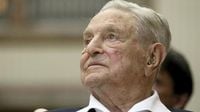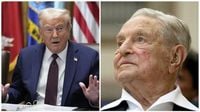On August 27, 2025, US President Donald Trump ignited a political firestorm with a pointed post on his Truth Social platform, calling for billionaire philanthropist George Soros and his son Alex to be charged under the Racketeer Influenced and Corrupt Organizations (RICO) Act. Accusing the Soros family of supporting violent protests across the United States, Trump’s message was as blunt as it was incendiary, labeling the pair as “radical left” and “psychopaths,” and warning, “Be careful, we’re watching you!”
Trump’s post didn’t mince words: “George Soros, and his wonderful Radical Left son, should be charged with RICO because of their support of Violent Protests, and much more… Soros, and his group of psychopaths, have caused great damage to our Country! That includes his Crazy, West Coast friends… Be careful, we’re watching you!” According to NBC News, this wasn’t the first time Trump had leveled such accusations, but the timing—just as protests flared in Los Angeles over immigration enforcement—gave the statement extra bite.
Despite the forceful rhetoric, Trump offered no evidence to support his claims. The president did not specify which protests he was referring to, nor did he clarify whether any formal investigation into the Soros family was underway. In fact, as AFP and Euronews Business reported, no law enforcement agency has announced any probe into George or Alex Soros based on Trump’s allegations.
The Open Society Foundations (OSF), the philanthropic network founded by George Soros, was quick to respond. In a statement to AFP, a spokesperson rejected Trump’s accusations outright: “These accusations are outrageous and false. The Open Society Foundations do not support or fund violent protests.” The organization emphasized its mission “to advance human rights, justice, and democratic principles in the US and around the world.”
Fact-checkers, including those at AFP, have repeatedly debunked conspiracy theories linking Soros to orchestrated violence, including claims that his organizations placed bricks on city streets for protesters—an allegation that resurfaced during the June 2025 Los Angeles demonstrations. Despite these efforts, the narrative persists, fueled by right-wing media and, now, the president himself.
So who is George Soros, and why does his name draw such ire from Trump and his supporters? Born György Soros in Budapest in 1930, he survived Nazi occupation during World War II before fleeing Hungary for the United Kingdom in 1947. After graduating from the London School of Economics, Soros moved to the United States and launched a hedge fund that would eventually make him one of the world’s most successful investors. His most famous financial maneuver—betting against the British pound in 1992—earned him over $1 billion in a single day and the nickname “The Man Who Broke the Bank of England.”
But it’s Soros’s political and philanthropic work that has made him a lightning rod. Through the Open Society Foundations, he has donated billions to causes supporting democracy, human rights, and public health in more than 100 countries. In the US, he is a major donor to the Democratic Party and liberal causes. According to Financial Times, Soros and his son Alex contributed more than $85 million to Kamala Harris’s 2024 presidential campaign. In January 2025, President Joe Biden awarded Soros the Presidential Medal of Freedom, citing his lifelong commitment to democracy and social justice.
Trump’s animosity toward Soros is hardly new. Over the years, the former president has repeatedly linked Soros to prosecutors, politicians, and protest movements he opposes. During Trump’s own 2024 hush money trial in New York, he claimed that Manhattan District Attorney Alvin Bragg was “controlled” by Soros—a claim the financier has denied. Trump’s latest outburst fits into a broader pattern of targeting Democratic officials and supporters, as NBC News and The New York Times have noted. His administration has previously opened investigations into Democratic fundraising platforms and media organizations, all while lobbing public accusations at prominent progressive donors.
Alex Soros, who took over the reins of the Open Society Foundations from his father in 2023, has continued the family’s support for Democratic candidates and causes. He co-chairs the foundation’s national finance council and played a key role in its recent strategic realignment. Like his father, Alex has become a frequent target in conservative media, especially after his vocal support for Kamala Harris in the last election.
Trump’s invocation of the RICO Act adds a layer of legal drama to the saga. Enacted in 1970 to combat organized crime, the law allows prosecutors to charge individuals who participate in a criminal enterprise and commit at least two related offenses within a decade. Over the years, RICO has been used to prosecute mafia bosses, drug cartels, and corrupt officials—but never a philanthropist for funding protest-related initiatives. Legal experts and critics have pointed out the lack of evidence and the unprecedented nature of Trump’s suggestion.
It’s worth noting that George Soros has faced legal scrutiny before, though never for the kind of crimes Trump alleges. In 1977, he was charged with stock manipulation in the US and settled without admitting guilt. A French court convicted him of insider trading in 2002, fining him $2.25 million. In 2009, Hungary’s financial regulator fined his firm for attempted stock manipulation. None of these cases involved protest funding or political activism.
The political context behind Trump’s latest move is impossible to ignore. As AFP reported, conspiracy theories about Soros have been a staple of both US and European far-right politics for years. He is frequently, and baselessly, blamed for migration crises and mass protests, including those following the 2020 killing of George Floyd. Many observers, including those at AFP, have noted the antisemitic undertones that often accompany attacks on Soros, who is Jewish.
Meanwhile, Trump himself has faced RICO charges in Georgia for his alleged attempts to overturn the 2020 election, though that case has stalled after the lead prosecutor’s removal. The irony has not gone unnoticed by commentators, who see Trump’s accusations against Soros as part of a broader strategy to discredit political opponents and rally his base ahead of the next election cycle.
For now, Trump’s call for criminal charges against George and Alex Soros remains a political maneuver—loud, headline-grabbing, but unsupported by evidence or legal action. The Open Society Foundations continues its work, undeterred by the accusations, while the Soros family, for better or worse, remains at the center of America’s partisan storms.





